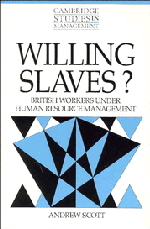Summary
Introduction
The employment policies of prominent non-union companies continue to arouse keen interest. Widely regarded as highly sophisticated, they are often seen as leading the way towards a new style of co-operative industrial relations. The practical appeal of these policies stems from a belief in their potential to resolve differences of interest between management and employees. The innovations made by such companies may have provided the blueprint for the practical development of ‘human resource management’ in a growing number of businesses.
Several distinctive features of management policy have emerged from the existing accounts of these ‘model’ organisations. Independent commentators have often identified a ‘company philosophy’ extolling values which bind members of the organisation together in a common culture (see, for example, Cressey et al. 1985). From the point of view of management, Peach (1983) has emphasised the importance of eliminating collective grievances over wages and job security through the provision of excellent salaries and employment prospects, and coping effectively with individual complaints through extensive procedures. Such an approach comprises a series of measures, the combined purpose of which is the creation of a high degree of commitment on the part of workers to the goals of their employer.
Since current thinking in industrial relations may owe an increasing debt to organisations which have pioneered such approaches to their employees, it has become correspondingly more important to cast an enquiring eye over their achievements.
- Type
- Chapter
- Information
- Willing Slaves?British Workers under Human Resource Management, pp. 97 - 126Publisher: Cambridge University PressPrint publication year: 1994



